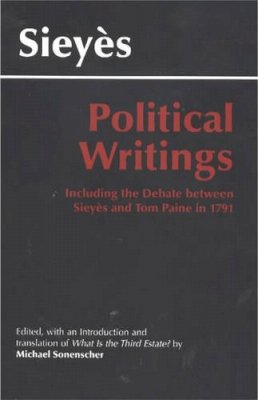19%OFF

Stock image for illustration purposes only - book cover, edition or condition may vary.
Political Writings
Emmanuel Sieyes
€ 19.99
€ 16.26
FREE Delivery in Ireland
Description for Political Writings
Paperback. .
The abbe Emmanuel Joseph Sieyes (1748-1836) distinguished himself as the chief theoretician of the French Revolution--and as a revolutionary constitutional and social theorist in his own right--through his rigorously analytical theory of representative government and its corollary, the representative character of social life in general. He expressed the essence of his thought in a series of three pamphlets published in the months leading up to the meeting of the Estates-General in 1789. This volume presents all three essays--Views of the Executive Means, An Essay on Privileges, and What Is the Third Estate?--in their entirety. The third essay, in a new ... Read more
Show LessProduct Details
Publisher
Hackett Publishing Co, Inc United States
Number of pages
192
Format
Paperback
Publication date
2003
Condition
New
Weight
307g
Number of Pages
256
Place of Publication
Cambridge, MA, United States
ISBN
9780872204300
SKU
V9780872204300
Shipping Time
Usually ships in 5 to 9 working days
Ref
99-22
About Emmanuel Sieyes
Michael Sonenscher is a Fellow and Director of Studies in History, King's College, University of Cambridge.
Reviews for Political Writings
This new English edition of some of Sieyes' key texts is to be warmly welcomed. . . . Michael Sonenscher's scholarly Introduction is devoted to a discussion of different aspects of Sieyes' political ideas, rather than to a detailed examination of the texts themselves. He concentrates mainly, and quite properly, on Sieyes' concept of representation, which he analyses with sensitivity, ... Read more
